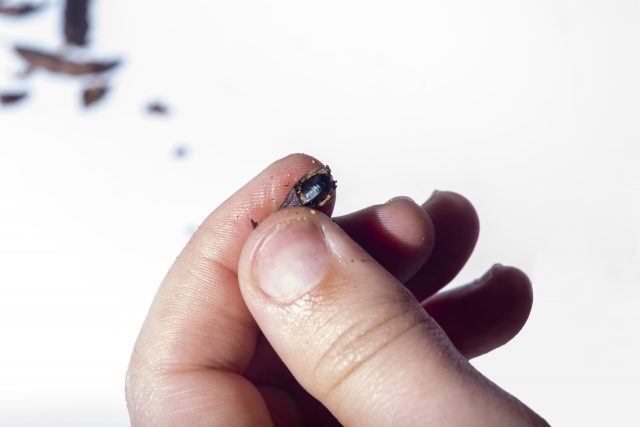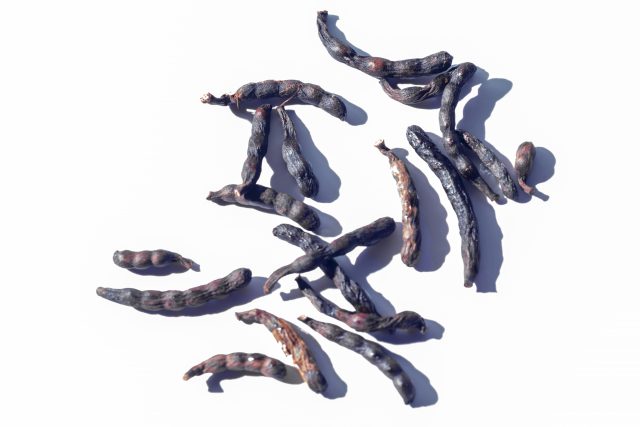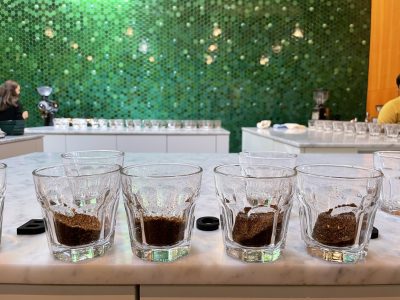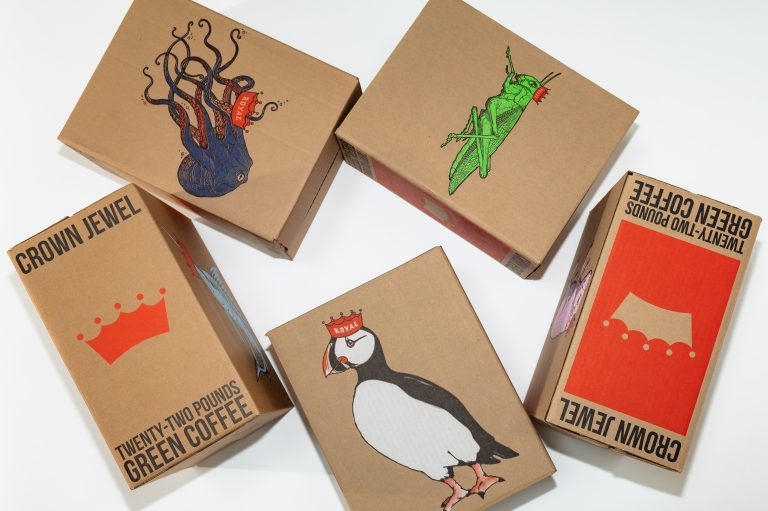There is a wealth of diversity in the way people prepare and consume coffee around the world. The cultural exchange that comes out of international interaction, and especially out of colonization, creates new traditions like Café de Olla, a Mexican beverage I’ve written about previously. These new traditions take snippets of the participating cultures’ culinary traditions as though they were ingredients from the kitchen cupboard, and create something new and very specific to that particular time and place. In the case of Café de Olla, indigenous Meso-American traditions fused with the coffee drinking practices of the Spanish invaders, creating a drink that is neither indigenous nor European, but fully Mexican. Coffee isn’t native to most places where it’s grown, so it offers a unique window into how different cultures evolve and interact with each other.
Café Touba is a great example of this: named after the holy city of Touba in Senegal, it’s a drink that can now be found easily, served out of mobile carts throughout the West African country. It’s made with Selim pepper (also known as grains of Selim or Guinea pepper), a spice that is not native to Senegal but which is imported in large quantities from the Gulf of Guinea, mostly from Gabon and Côte D’Ivoire. Traditionally, the Selim pepper is thrown in towards the end of the coffee roasting process to toast up with the coffee beans, but the same effect can be achieved by toasting the grains in a pan on the stove. Café Touba is usually made as an infusion in large batches that can be sold, one small paper cup at a time, from the carts that either wander the streets or wait at busy intersections. It’s become such a staple in Senegal that I found multiple news articles describing how Café Touba was overtaking national consumption of Nescafé – a significant feat.

The Man Behind the Beverage: Serigne Touba
Café Touba was brought to Senegal in the early twentieth century by Sheikh Amadou Bamba, a Sufi religious leader who founded the Mouride Brotherhood in Senegal. Born in 1853, Sheikh Bamba founded the Mouride brotherhood, a sect of Sufism that many Senegalese still practice today. He also established the city of Touba, now the second most populous city in Senegal, and is affectionately called Serigne Touba. was vehemently opposed to French colonial rule, and was especially concerned with the Catholic evangelism the French were spreading through West Africa.
Serigne Touba vehemently opposed the tactics of colonization; beyond just exploiting Senegal for its natural resources, the French intended to ‘civilize’ the Senegalese. This included converting everyone to Catholicism and making the culture conform to European ideals. Serigne Touba knew that if the French left Senegal the land would eventually recover, but the social effects of colonization would persist long after the invaders left. If the Senegalese were robbed of their cultural identity, Serigne Touba feared that the people would continue to participate willingly in their subjugation, and would “rush to bring [the Europeans] our wealth on a silver platter.” He strove to awaken Africans to the inferiority complex that was being forced on them, and to preserve native African (especially Muslim) traditions. He was an early participant in Pan-Africanism, an intellectual movement that sought to unify and empower both continental Africans and victims of the diaspora; he believed that Islam could be an important tool for African liberation.
Serigne Touba was a profound pacifist, but he encouraged his followers to participate in what he called ‘anti-colonial disobedience.’ He had such a devout following that he could have easily roused a military force against the French if that had been his wish. Instead, his non-violent resistance relied, in his words, on science and piety, with the Quran and the Hadiths as his weapons. His firm but peaceful resistance made him a powerful symbol for the people of Senegal; to this day, Serigne Bamba’s image is displayed everywhere – on murals, in restaurants, or framed in peoples homes. He gathered far too much support for the comfort of the French, and so was sentenced him to a long exile first in Gabon and later in Mauritania. Although the French eventually relented and allowed him to return to Senegal, Bamba remained under surveillance for the remainder of his life.
It was in Gabon that he first encountered grains of Selim. Xylopia aethiopica (known as djar in Wolof, one of the native languages of Senegal) is native to the coast of Guinea and is used in traditional medicine there. In his book Discussions of the Master of Tuubaa, Serigne Touba’s grandson Serigne El Hadji Falilou MBacké, says that the Serigne noticed that the French drank coffee all day, and that it seemed to give them abounding energy. Asking why they drank the bitter brew, the French told him that among other things, it improved the quality of their work. The sanctity of work is one of the central pillars of Mouridism, so Serigne Touba responded: “If you [the French], who care only about this base world, drink coffee to awaken yourselves with the goal of improving your work, then we, who wish to succeed in both worlds, should take even more advantage of this coffee than you.”
Upon returning to Senegal from exile, his followers found that the Serigne drank coffee daily, especially before prayers, and always with a bit of Selim pepper mixed in. In this way Café Touba, as the master himself called it, began as a sacred drink for the Mourides. The Sheikh even gave specific instruction on how to brew his Café Touba, citing prayers that should be recited before and after preparation.

Café Touba in Daily Culture
After Serigne Touba’s death in 1927, the Mourides began building the Great Mosque of Touba, which is today the largest mosque in sub Saharan Africa. Serigne Touba’s remains rest there, and every year there is an enormous festival called the Grand Magal which celebrates the anniversary of the Serigne’s exile to Gabon, but which also serves as an pilgrimage for the Mourides. During this time, the population of Touba swells to more than 3 million, and Café Touba again becomes a sacred drink.
Although the monks rarely participate in politics themselves, it’s worth noting that the Mouride Brotherhood holds a significant amount of political power in Senegal. During Grand Magal the Sheikhs hold audiences with favored political figures, an important gesture in a country whose population is more than 90% Muslim, with half of these subscribing to the Mouride sect of Sufism. This practice of receiving governmental delegations began in the colonial period as a way to allow mutual recognition between the Mourides and the French colonial government. Even Café Touba is an example of the sect’s political power: originally a beverage unique to the Mouride Brotherhood, the fact that it is become so pervasive in Senegalese culture is an indication of how much influence this sect wields.
These days, Café Touba is part of the daily routine. Mobile carts of hot, fresh Café Touba are a common sight, and many young people take jobs running their own carts. The trade has become an important part of Senegal’s local economy, since the vast majority of people drink Café Touba daily. The drink has a few different pet names, one of them being “keroséne” for its intense smell. It’s also sometimes called Café Ngoon/café de soir, because it’s often taken in the afternoon (ngoon means afternoon in Wolof).

Peppering In Some Café Touba
To make Café Touba, you’ll need Selim Pepper (I’ve been buying mine from Spice Ace in San Francisco), coffee, and water. Like so many coffee beverages, Café Touba is often served with sugar but tastes lovely on its own. There are two ways to prepare the Selim pepper: for the “keroséne” effect, toast the entire pod for a few minutes in a pan or in the oven, and grind it up in a spice grinder. This is by far the easier method, but it imparts a much more powerful taste and aroma to the final beverage. The other option is to painstakingly liberate the grains from their pods, a process that becomes easier if the pods are toasted up first, but which will remain an ordeal regardless. The resulting seeds create a more delicate raisin and ginger note in the coffee, and offer entirely unique experience. Most recipes ask for at least one fourth the amount of Selim as coffee, for example 10g of Selim powder for a 40g coffee dose. Since it’s traditionally made as an infusion, I’ve been brewing Café Touba in a Chemex with excellent results.
Café Touba offers a story of resistance and of cultural blending entirely unique to Senegal. These traditions are immensely valuable, and the recipes born out of the convergence of multiple cultures are worth acknowledging and learning from. They also happen to be delicious. In the case of Café Touba we have the opportunity to taste a spice from Gabon, a coffee tradition brought to Africa by the French, and a recipe created by a Muslim sect in Senegal all coming together to create a delightful drink.


